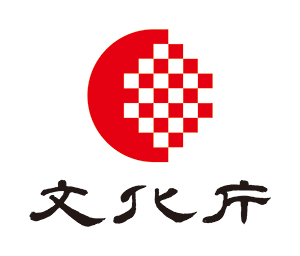Performance
Yasuko Yokoshi / Aichi Prefectural Art Theater
Lynch (a play)
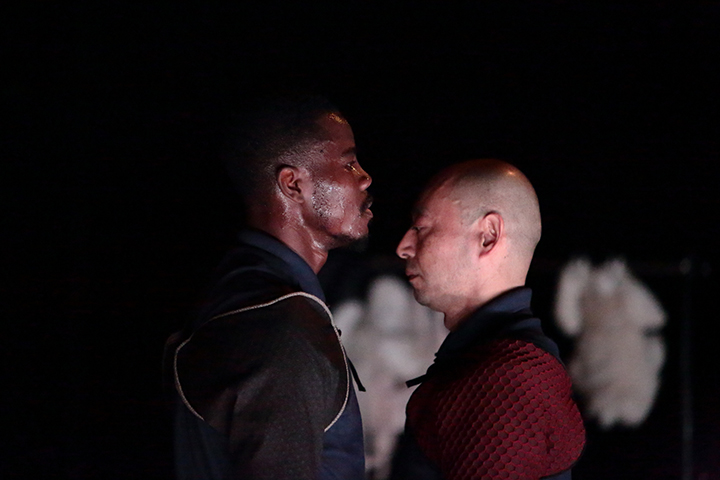
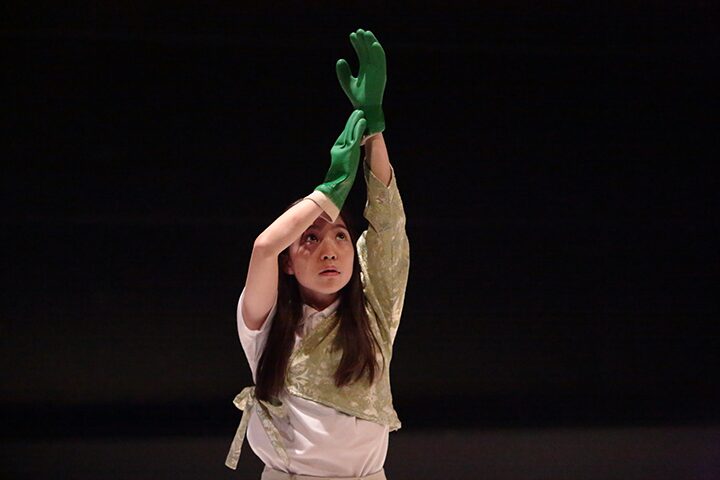
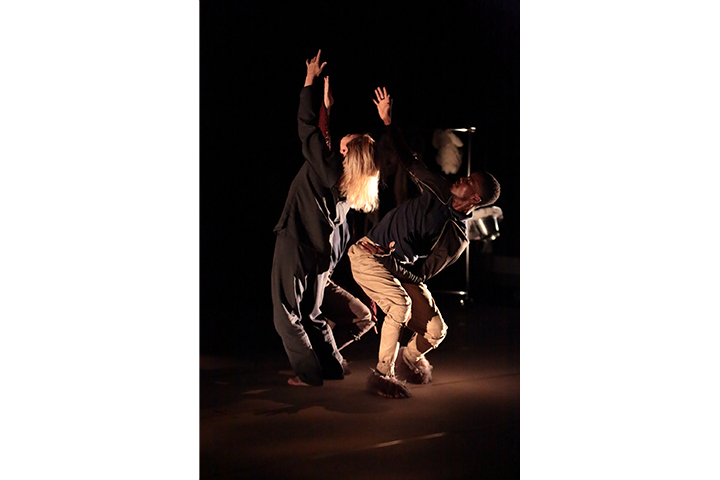
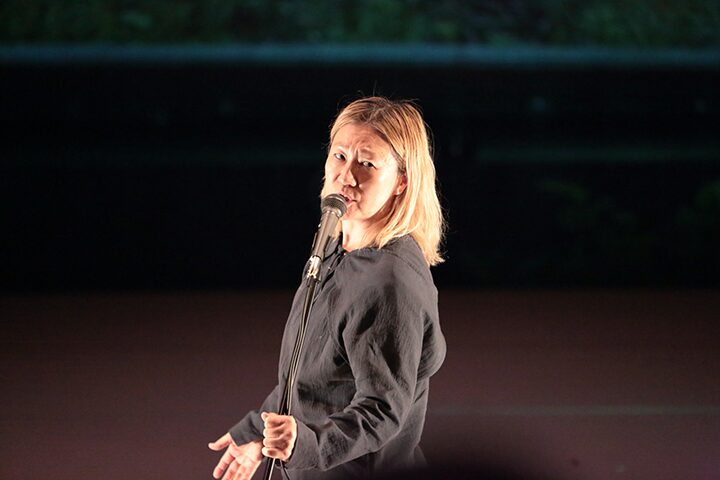
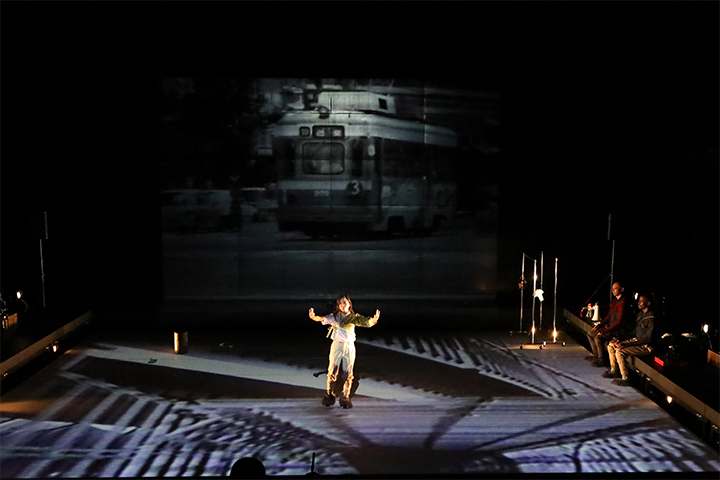
Friction between the body and modernity:
A response to a script deemed impossible to perform
The AAF Drama Award explores the question of what is a script. Winner of the twentieth award, Lynch (a play) by Yoshiro Yoda Hatori begins with an enigmatic stage direction: “There is no need for you to be watching. The head above the ears touches a level surface.” This is followed by lines in which the subject and meaning is difficult to immediately grasp. Choreographer and director Yasuko Yokoshi, long based in New York and the winner of two Bessie Awards, took on this difficult work that defies easy assumptions about performance and leaves many readers perplexed. Following its highly acclaimed premiere at the Aichi Prefectural Art Theater in 2022, this marks the first staging of Lynch (a play) in Kansai.
Yokoshi’s production does not aim to be a theatrical version of the script but instead adopts a dance-like approach. In response to the sharp perspective on modern Japanese history Hatori has embedded in the script, the performers, including Yokoshi herself, draw on their private experiences and physically, through their bodies, reveal the inescapable structure of control and subordination of the system of the modern nation-state. The performers dance with the tension between themselves and the words of the script. What is being questioned here? The script? Modernity? Or dance?
10.25 (Fri) 16:30 ★
10.26 (Sat) 16:30
10.27 (Sun) 15:30 ◆♡
★ Post-show talk
◆ Festival Share Cafe (Language: Japanese only)
♡ Childcare Service (reservation required 7 days before each performance)
Duration: 100 min
Japanese with English surtitles
⚠️ No admission for preschoolers.
Yasuko Yokoshi
Kyoto, Japan
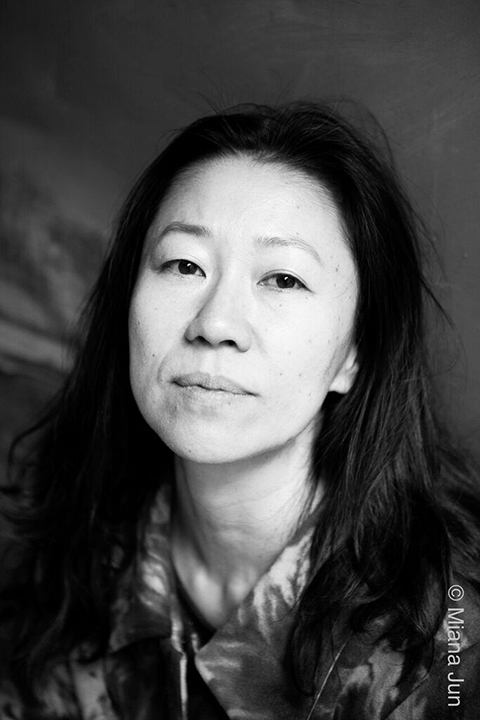
Born in Hiroshima, Yokoshi is a choreographer, dancer, and filmmaker. From 1996 to 2015, she was based between New York, Tokyo and Amsterdam and created numerous dance performances and video works. Since 2015 she has been based in Kyoto. She was awarded a John Simon Guggenheim Memorial Foundation Fellowship, Foundation for Contemporary Arts Award, and Performance “Bessie” Awards for two consecutive years. She is also the recipient of a Creative Capital grant and a New York Foundation for the Arts Artist Fellowship. From 2011 to 2013, Yokoshi produced and performed BELL as the first resident commissioned artist at New York Live Arts (NYLA). Her autobiography Once in a Lifetime received the Mori Ogai Literary Award (Kitakyushu City Autobiography Literature Award) in 1990 and was published by Gakken. Her independent film Hangman Takuzo (starring Kubikukuri Takuzou, Mika Kurosawa and Namiko Kawamura) has been screened at Kobe Planet Film Archive, Image Forum, m h project (NY) and BankART in Yokohama.
Script: Yoshiro Yoda Hatori
Direction, Choreography and Performance: Yasuko Yokoshi
Choreographic collaboration and performance: Masaru Kakio, Alain Sinandja, Nanako Komatsu
Stage Management: Masaya Natsume
Lighting: Asako Miura
Video: Yoshitaka Shimada
Sound: Bunsho Nishikawa
Costume: Akiko Iwasaki
Producer: Mugiko Yamamoto
‘History Lessons’ Supervisor: Satoshi Nishi
Video cooperation: Toms Entertainment "Ashita no Joe" ©Asao Takamori, Tetsuya Chiba / TMS, Kottodori Law Offices
Art provided by Mio Arai, Tomoko Goshima, Shigeru Shintani, Shin Degawa, Takashi Kunitani
Conceptual Contribution: Ichiro Awazu
Creative cooperation: Soichiro Migita, Satoko Shibata, Kentaro Hisatomi, Hazuki Ozawa, So Fukuoka
Production cooperation: DANCE BOX
In co-operation with Kyoto Art Center Artists-in-Studios program (2022), Akito Hirano, Yuta Hagiwara, Ryuichi Tani
English surtitles: Mika Eglinton, Andrew Eglinton
Produced by Aichi Prefectural Art Theater (Aichi Arts Foundation)
Premiere: 20th Aichi Arts Foundation Drama Award
Sponsored by Performing Arts Center MEGURO
Supported by Agency for Cultural Affairs, Government of Japan|Japan Arts Council
Presented by Kyoto Experiment
